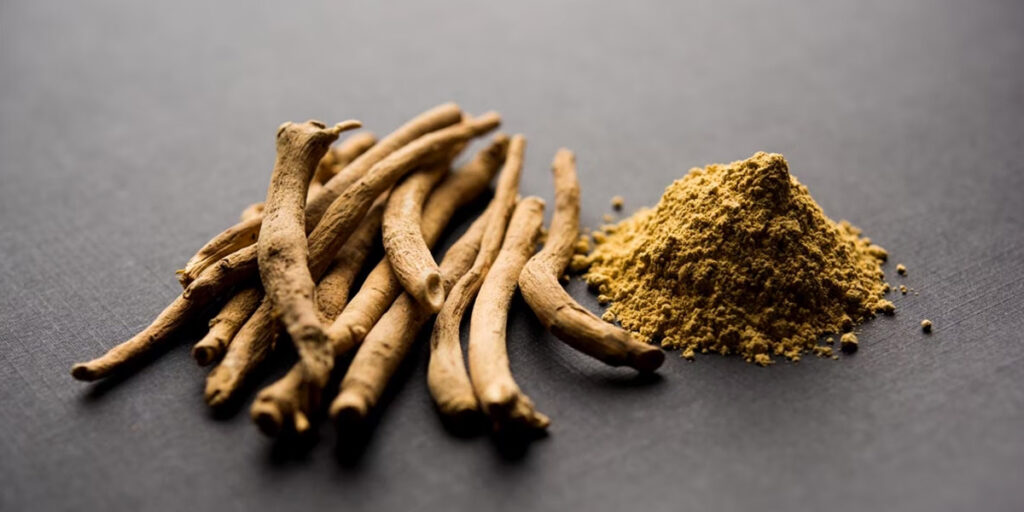
How Long Does Ashwagandha Stay In Your System
Key Takeaways
- The length of time ashwagandha remains in your body varies from person to person and depends on factors like age, weight, dose and metabolism, as well as the specific product you are taking.
- There are no definitive guidelines regarding the most effective way to take ashwagandha and there is currently no data on the long term use of ashwagandha.
- Ashwagandha supplementation has been seen to be safe and well tolerated in amounts from 300 mg – 600 mg daily for up to 12 weeks.
Ashwagandha, also known as Indian ginseng, is a herb that has been used for centuries as a traditional Ayurvedic medicine. Various parts of the plant can be used, but in supplements, you will find it is typically an extract of the plant’s roots.
Its root has a horsey smell and is said to confer the strength and virility of a horse. This is where ashwagandha gets its name. In Sanskrit, ashva means “horse” and gandha means “smell”, so ashwagandha literally means “smell of horse”. (Source)
Ashwagandha has risen in popularity in the mainstream following the emergence of clinical research supporting its various health benefits.
Ashwagandha is considered by many as an adaptogen, meaning it can enhance the body’s resilience to stress.
Having been used for over 3,000 years as an Ayurvedic remedy against various ailments, clinical science has recently linked ashwagandha supplementation to health benefits such as reduced stress and anxiety and improved blood sugar levels, mood, and memory.
Test tube and animal studies suggest that ashwagandha may be beneficial to these various aspects of health, but evidence in human studies thus far has varied. (Source)

How Long Does Ashwagandha Stay In The Body?
There seems to be a theory that ashwagandha may take up to a month to leave the body, with the water-soluble compounds leaving the body between 2-3 days, while the fat-soluble compounds may take a month.
However, there is no significant body of evidence to support this, and in reality, the length of time ashwagandha remains in your body will vary from person to person and depend on factors like your age, weight, dose, metabolism, and health conditions.
It can also depend on the specific product you are taking. Variations between products about extraction methods, formulation, and composition can affect the body’s response.
Can Ashwagandha Be Taken Daily?
Ashwagandha is commonly taken in capsule, gummy, tea, or powder form.
Although there is no standard dosage, studies on ashwagandha have used daily dosages ranging from 120–5,000 mg of a root extract.
The most common dosing protocol is 600 mg daily, divided into two 300 mg doses, with one taken in the morning and the other in the evening, and this has been considered safe for healthy adults. (Source)
It is generally considered safe to take ashwagandha daily, with some studies finding daily supplementation of 300mg for 90 days safe and well tolerated. However, there is no significant data on the effects of taking it in the longer term. (Source)
In some cases, taking high doses of ashwagandha can cause unpleasant side effects such as digestive upset, diarrhea, nausea, and vomiting. (Source)
If you are concerned about potential side effects, you might like to start with a lower dose and work your way up as you notice your body’s reaction.
It is always best to consult a healthcare professional about safety and dosage before taking any new herbal supplements, including ashwagandha.
Should You Cycle Ashwagandha?
Questions often crop up around whether taking breaks from ashwagandha supplementation is necessary.
As mentioned, there is currently no data on the long-term use of ashwagandha. There are also no guidelines regarding the optimum amount of time to take ashwagandha for different ailments.
For this reason, only taking ashwagandha for the time specified by your healthcare practitioner is advisable.
Ashwagandha is usually taken with a specific purpose in mind, to manage anxiety for example, and is not traditionally taken continually over an extended period of time.
Stopping to take your ashwagandha supplement after the advised amount of time allows you to assess your feelings without it and potentially reassess your needs. Perhaps you no longer need to take it, or maybe you can reduce your dosage.
This can all be decided through discussion with your healthcare practitioner.
Regarding effectiveness, it is currently not known whether ashwagandha loses its potency with daily long-term usage, but it is a possibility. However, it is also unknown whether taking breaks from ashwagandha or taking it every other day prolongs its effectiveness.

Are There Reasons To Stop Taking Ashwagandha?
While ashwagandha is generally considered safe for the general population, there are some circumstances where supplementing with ashwagandha is not advised.
Side Effects
If you experience any side effects when taking ashwagandha, stop taking it and consult a healthcare professional.
Pregnancy And Breastfeeding
Those who are pregnant or breastfeeding should avoid ashwagandha. There is no conclusive evidence to support supplementing with ashwagandha, and it may potentially cause harm.
Consult your healthcare practitioner before taking any supplements when pregnant or lactating.
Surgery
In order to avoid any interaction with medications or anesthesia during surgery, follow your surgeon’s recommendations. This typically involves stopping all supplements, including ashwagandha at least two weeks before a scheduled surgery.
Certain Medication
Ashwagandha may interfere with certain medications. You may need to avoid taking ashwagandha if you are taking other medication, including:
- Immunosuppressant medication
- Sedative medication
- Thyroid hormones
- Diabetes medication
- Antihypertensive medication
Consult your healthcare practitioner before taking ashwagandha if taking other medication or supplements.

In Summary
Recent evidence supporting the use of ashwagandha for various health issues has contributed to its rise in popularity in the health and wellness space.
While there is evidence from animal and small human studies that suggests ashwagandha might provide certain health benefits, larger human studies are still needed to confirm these benefits.
Definitive guidelines regarding the most effective way to take ashwagandha have not yet been established, but it has been seen to be safe and most commonly taken in a 300 mg dose once a day or one 300 mg dose twice a day, for up to 12 weeks.
As the long-term use of ashwagandha has not been studied and the effects of usage in the long term remain unknown, it is advised to only take ashwagandha for the amount of time specified by your healthcare practitioner.
If you want to try ashwagandha, Human Tonik’s Supergreen Tonik contains 500 mg of ashwagandha root extract in each serving, along with other beneficial nutrients.
Ashwagandha should be avoided by anyone who experiences side effects or is pregnant, breastfeeding, or having surgery.

Lucy Brennan is a registered associate nutritionist (ANutr) and freelance writer specializing in health, nutrition and wellness content. She holds a BSc. (First Class Hons) in Public Health Nutrition and has over 4 years’ experience working in health communication, which is where her passion lies.
She has worked in roles with The Irish Food Board and FleishmanHillard PR, on their healthcare team, working with national and international health companies. Using this experience, Lucy now writes content in a freelance capacity. Lucy is dedicated to providing evidence-based content that is both engaging and accessible and inspires readers to make informed choices regarding their health.











